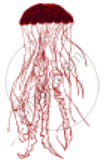Advertisements
Advertisements
Question
Give scientific reason.
Our body irritates if it comes in contact with a jellyfish.
Solution
- The mouth of jellyfish is surrounded by tentacles.
- The tentacles possess cnidoblasts which are used for capturing prey or for defense.
- When our body comes in contact with the tentacles of jellyfish, these cnidoblasts penetrate our skin as a defensive action.
- Cnidoblast injects the toxin in our body and thus, our body irritates if it comes in contact with jellyfish.
APPEARS IN
RELATED QUESTIONS
Label the following.

Tentacles are used for capturing the prey.
To which phylum we belong to, if we are marine/aquatic animals?
How do we destroy the harmful insects?
Draw a neat and labelled diagram.
Hydra
State whether true or false. If false, correct the statement.
Canal system is seen in coelenterates.
Match the following.
| PHYLUM | EXAMPLES | ||
| (A) | Coelenterata | (i) | Snail |
| (B) | Platyhelminthes | (ii) | Starfish |
| (C) | Echinodermata | (iii) | Tapeworm |
| (D) | Mollusca | (iv) | Hydra |
What is nematocyst?
Why coelenterates are called diploblastic animals?
Real organs are absent in
______ are diploblastic.
What is polymorphism?
What is metagenesis? Mention an example which exhibits this phenomenon.
Provide appropriate technical term in the space provided.
Free-floating form of cnidaria ______.
Match the following:
| Animals | Locomotory Organ |
| a. Octopus | i. Limbs |
| b. Crocodile | ii. Comb plates |
| c. Catla | iii. Tentacles |
| d. Ctenoplana | iv. Fins |
Name
An animal with cnidoblasts
Give an example for the following:
Animal, which exhibits alternation of generation
